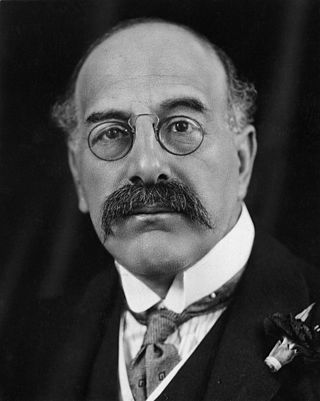Top Qs
Timeline
Chat
Perspective
Alfred Mond, 1st Baron Melchett
British industrialist, financier and politician (1868–1930) From Wikipedia, the free encyclopedia
Remove ads
Alfred Moritz Mond, 1st Baron Melchett, PC, FRS, DL (23 October 1868 – 27 December 1930), known as Sir Alfred Mond, Bt between 1910 and 1928, was a British industrialist, financier and politician. In his later life he became an active Zionist.
Remove ads
Early life and education
Mond was born in Farnworth, near Prescot, at that time in Lancashire. He was the younger son of Ludwig Mond, a chemist and industrialist who had emigrated from Germany, and his wife Frieda, née Löwenthal, both of Jewish extraction. He was educated at Cheltenham College and St. John's College, Cambridge,[1] but failed his natural sciences tripos. He then studied law at the University of Edinburgh and was called to the bar by the Inner Temple in 1894.[2][3]
Remove ads
Business career
After his law studies, he joined his father's business Brunner Mond & Company as a director, later becoming its managing director. His other directorships included the Westminster Bank and the Industrial Finance Investment Corporation.[citation needed]
One of his major business achievements came in 1926, when he worked to create the merger of four companies to form Imperial Chemical Industries (ICI), one of the world's largest industrial corporations at the time.[2] He became its first chairman.[4]
Mond was also managing director of his father's other company, the Mond Nickel Company, of which he inherited the majority of shares. He was an active director from the outset, and amongst other growth projects he commissioned the Coniston smelter and the Acton, London nickel carbonyl refinery. He saw the sense in Robert C. Stanley's overture because of the Frood Mine problem and recommended the merger of his company into the International Nickel Company, which was accomplished on 1 January 1929. Thereafter he sat as a director of the combined company.[5]
Remove ads
Political career
Summarize
Perspective
Mond was also involved in politics and sat as Liberal Member of Parliament for Chester from 1906 to 1910, for Swansea from 1910 to 1918 and for Swansea West from 1918 to 1923. He served in the coalition government of David Lloyd George as First Commissioner of Works from 1916 to 1921, and as Minister of Health (with a seat in the cabinet) from 1921 to 1922. After losing his seat at the 1923 general election, he returned to Parliament as a Liberal for Carmarthen at a by-election in August 1924, holding the seat until his elevation to the peerage in 1928. Although a supporter of the "New Liberalism" in his early political career and a "vocal proponent of constructive social reform" in the postwar government,[6] Mond became a Conservative in January 1926 after falling out with Lloyd George over the former Prime Minister's controversial plans to nationalise agricultural land.[2][7][8]
Mond was created a Baronet, of Hartford Hill in Great Budworth in the County of Chester, in 1910,[9] and was admitted to the Privy Council in 1913.[2][10] In 1928 he was raised to the peerage as Baron Melchett, of Landford in the County of Southampton.[2][11]
Mondism
In the aftermath of the 1926 General Strike, Mond led efforts to establish cooperation between workers (represented by trades unions and the General Council of the TUC) and the large employers; this short-lived initiative became known as Mondism.[12][13]
Benefactions, Zionism and honours
Summarize
Perspective


Sir Alfred Mond: "I'm sorry to have to disturb Your Majesty, but, owing to the shortage of sites—"
George III: "Shortage of sights, indeed!"
Cartoon from Punch, 18 August 1920
Mond's father had bequeathed a collection of old master paintings to the National Gallery, and Alfred provided housing for them in 1924. In 1929 he provided land in Chelsea for the Chelsea Health Society.[2]
An enthusiastic Zionist, in 1920 Mond donated ten thousand pounds to Vladimir Jabotinsky.[14] The following year he visited Palestine with Chaim Weizmann. He contributed money to the Jewish Colonization Corporation for Palestine and wrote for Zionist publications.[2] He became President of the British Zionist Foundation and made financial contributions to Zionist causes.[15] Melchett founded the town of Tel Mond, now in Israel.[16] He also started building what is now one of the few private houses on the shore of the Sea of Galilee, now known as Villa Melchett. Tel Aviv and several other Israeli cities have a Melchett Street commemorating him.
One of Mond's most enduring contributions to Zionism did not come through direct political means but through his enthusiastic and active support of Pinhas Rutenberg, to whom the British Government granted exclusive concessions to produce and distribute electricity in Palestine. Mond sat on the Board of the Palestine Electric Company and promoted the case of the company in London's political and industrial circles.[17]
Mond was elected a Fellow of the Royal Society in 1928 and received a number of honorary degrees from Oxford, Paris and other universities.[2]
Remove ads
Personal life
In 1894 Mond married Violet Goetze and they had one son, Henry Ludwig, and three daughters, Eva Violet, Mary Angela, and Norah Jena. Mond died in his London home in 1930, and his son succeeded in the barony.[2]
Publications
- Industry and Politics (1927)
- Imperial Economic Unity (1930)
Literary references
Mond is mentioned in T. S. Eliot's 1920 poem A Cooking Egg.[18] He is also – along with the Turkish leader Mustafa Kemal Atatürk – widely considered to be the inspiration behind Mustapha Mond, one of the ten world controllers in Aldous Huxley's 1932 novel Brave New World.[19]
Coat of arms
 |
|
Remove ads
See also
References
Further reading
External links
Wikiwand - on
Seamless Wikipedia browsing. On steroids.
Remove ads

